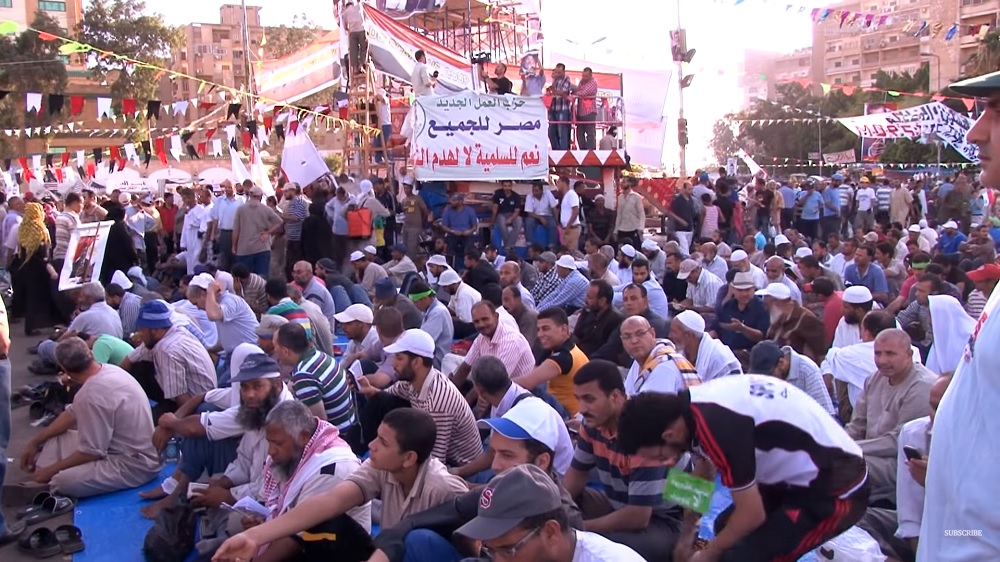When members of the Muslim Brotherhood began arriving in Europe in the 1950s and 1960s, they generally did not intend to stay; they had fled states like Egypt and Syria, where radical republican regimes had cracked down on the Brethren, but they intended to return one day. Eventually, however, a realization set in that the Brothers would not get to go home, and they began making lives in Europe—and this meant getting involved in politics. For various reasons—some entirely contingent, like the presence of Said Ramadan (1926-1995), the son-in-law of the Brotherhood founder, Hasan al-Banna (1906-1949); some more structural, namely economic power—the Brotherhood was especially drawn to Germany, and the German state has struggled over the past few decades in how to conceptualize and ultimately combat the Islamists on its territory.
A persistent problem … is identifying the Muslim Brotherhood, since its very structure in Europe is designed to disguise its existence, never mind its ideology and activities.
As EER has previously explained, Germany’s government has been through roughly four stages in how it handles the Muslim Brotherhood:
- 1950-2001: A lack of understanding, and where there was understanding an indifference, from the state about what the Brotherhood was and what its intentions were within Germany.
- 2001-2011: The 9/11 attacks forced a serious recalibration of German policy towards the Brotherhood, especially once it became clear that Al-Qaeda leader Osama bin Laden had been ideologically influenced by the Brotherhood and that Brotherhood networks in Germany had alarming connections with the 9/11 conspirators.
- 2011-2014: With the “Arab spring” and the rise of Brotherhood and Brotherhood-linked governments in Egypt, Tunisia, Libya, and elsewhere, Germany came to believe that it would have to accommodate itself to the Brotherhood. This policy swiftly evaporated when the Brotherhood-derived governments collapsed in 2013-14 and the rise of the Islamic State (ISIS) “caliphate”, with the wave of terrorism in Europe, once again reminded the Germans that the Muslim Brotherhood’s program—eroding social cohesion and spreading extremist ideas—was an enabler of extremist groups like ISIS and Al-Qaeda.
- 2014-present: Germany has turned towards a more comprehensive approach that no longer simply focuses on illegal activity, but seeks to constrict the space for the Brotherhood and its message.
A persistent problem—and not just in Germany—is identifying the Muslim Brotherhood, since its very structure in Europe is designed to disguise its existence, never mind its ideology and activities. In legalistic societies such as Europe’s, this creates immense difficulties for the authorities as they look to map out networks, financial links, hate speech disseminators, and the rest of it.
A further problem for Germany (and others), recently highlighted in a question tabled for the European Union parliament, is whether the state can lead a campaign against the Brotherhood if the Brotherhood is receiving money and other support from outside, which falsely inflate its apparent popularity and strength, allowing it to capture institutions, notably media outlets and departments at universities. The questioner specifically mentioned Qatar as a source of funds for the Brotherhood; he could also have mentioned Turkey, which under President Recep Tayyip Erdogan has been very active sponsor of the Brotherhood, included in its armed format in Syria and Libya.
Despite the challenges, Germany seems to be heading in the right direction. Signs of this change came earlier this year, when German intelligence highlighted in public its concerns about the Brotherhood. Likewise, the recent decision of the Central Council of Muslims in Germany (Zentralrat der Muslime in Deutschland or ZMD) to expel the “German Muslim Community” (DMG), one of Brotherhood façades reflects the changed mood in Germany.
Berlin is clearly following the model set out by Austria and France in terms of dealing with “non-violent” Islamism; those countries have found sophisticated ways of identifying the Brotherhood structure, as well as more blunt, highly effective means of cutting off the Brotherhood’s foreign financiers and extremist potential. For instance, France has closed multiple mosques that support the Muslim Brotherhood’s ideology, and has enacted policies to vet imams. It can be added that a state with a much less aggressive anti-Islamist posture, Sweden, has recently taken steps to curb the Brotherhood’s space to operate.
Germany, then, is moving within a consensus in Europe as it confronts the Muslim Brotherhood, which for domestic political reasons is very important to the sustainability of the policy. Another fortuitous aspect in the timing is that the Brotherhood itself is falling apart: it means even relatively minimal efforts can have a serious impact in degrading the Muslim Brotherhood’s efforts to spread its extremist ideology.
